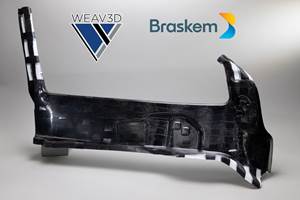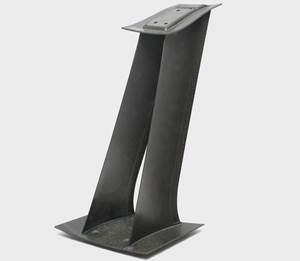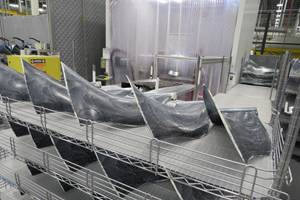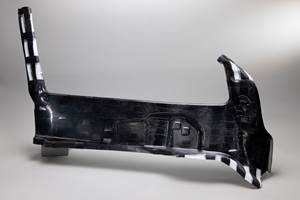Making better composite bikes in Arkansas
Bicycle manufacturer HIA Velo (Little Rock, AR, US), maker of carbon fiber bikes, is using a combination of composite materials to make their products more durable.
It’s a fact that the vast majority of bicycles sold in the US are made abroad. According to one source (www.statista.com, data from 2015), 99% of bicycles sold in the US were imported from China and Taiwan. So it was interesting to hear of bicycle manufacturer HIA Velo (Little Rock, AR, US), maker of carbon fiber bikes in the US, in-house, using a combination of composite materials to make their products more durable (the HIA in the company’s name denotes “Handmade in America”). The company recently introduced the brand name Allied Cycle Works, and its Alfa bicycle models.
The company began in early 2016, according to James Huang, global tech editor for bicycling blog and web site Cycling Tips (https://cyclingtips.com/2018/06/allied-alfa-allroad-long-term-review-the-antidote-to-the-n1-rule/ ), when the founders bought the assets of a bankrupt Canadian bike manufacturer and brought everything to Little Rock. A team came together that included, in HIA Velo’s words, “…current and former bicycle racers, speed junkies, and enthusiasts. We love bicycles and are endlessly in the pursuit of…classic, strong, utilitarian design.” Founder Tony Karklins (who has since left the company) says in a recent LinkedIn article that the great advantage of producing bikes in-house is that you can communicate and implement design changes instantly: “Conventional wisdom in the bike industry says that carbon fiber bike manufacturing can only be accomplished in Asia. We think that’s ridiculous. Because our engineering team works on the factory floor, [we can] implement process improvements as needed and make constant improvement.” He adds that one of the challenges of dealing with Asian factories is the need to forecast up to two years ahead of when you need the product, and, if that product has a problem, you then have a warehouse full of that problem: “With domestic just-in-time manufacturing, we never have compromised product on hand and you always get our latest and best work.”
HIA Velo’s director of engineering Sam Pickman, who came to the company from Specialized Bicycle Components (Morgan Hill, CA, US), tells me that “designing and making carbon fiber bikes involves compromises that you try to overcome. You must balance stiffness and handling with ridability and comfort.” Allied Cycle Works’ Alfa frames are typically made with 6 plies of Mitsubishi Chemical Carbon Fiber & Composites Inc.’s (Irvine, CA, US) unidirectional carbon prepreg, including 130 gsm standard modulus carbon and 110 gsm intermediate modulus carbon, prepregged with Mitsubishi’s Newport 301 epoxy resin and supplied in 1m-wide rolls. Pickman also reports that the company is investigating 114 gsm TeXtreme spread-tow woven material supplied by Oxeon (Boras, Sweden), as an alternative to unidirectional prepreg. Pickman acknowledges that the lightweight carbon fiber frame tubes can be damaged, because carbon fiber is brittle, and riders crash, particularly those involved in racing: “And typically they can’t see the damage, after the crash, so riders get back on, keep going, and then the unseen damage propagates and the frame can unexpectedly come apart.”
Pickman adds that the tooling for the bicycle parts, supplied by Southwest Pattern Works (Albuquerque, NM, US) is the tooling provider for all carbon fiber molds: “As we were starting up we struggled to find a tooling shop that was a match for us until we were introduced to John Groth and his team. They don't just simply open your files and make to the print, they look at the parts critically and offer suggestions.” Pickman goes on to say that on two occasions the toolmaker found mistakes in tooling models that saved pain down the road. “Our relationship with HIA has helped expedite their quick product launch and part quality,” says Groth.
Here’s how HIA Velo is making their composite better: adding plies of Innegra Technologies’ (Greenville, SC, US) woven biaxial Innegra S high-modulus polypropylene fabrics to areas of the Alfa bike frames. “We use the Innegra fiber for two purposes. The first is to provide flex — the polypropylene is very flexible, ductile and damps vibrations, so that it increases ride comfort. The second purpose is that it is flexible, tough and absorbs impact, so we use it in the areas of the frame that are potentially most damage-prone.” The graphic below, taken from one of HIA Velo’s videos, shows those areas of the frame where the Innegra prepreg material is incorporated: the seat stays, the top tube where the handlebars could impact the tube, and the fork crown, which, says Pickman, “is a part you never want to break.” Innegra’s composites specialist and long-time industry expert Russ Emanis assisted HIA Velo with incorporation of the Innegra material, which is sized for compatibility with epoxy resin, into the Little Rock production line, including appropriate oven ramps and temperature dwells.
The company typically incorporates the Innegra plies in the center of the tube layup, encapsulated within carbon plies, with the Innegra often forming the innermost ply of the tube. This, says Pickman, gives the best result based on their testing. When I ask why not use more of the Innegra throughout the frame, he explains “The polypropylene adds weight, and no stiffness. We have to pick and choose where we want the flex and ductility, because weight is a factor.” Models incorporating the Innegra reinforcements include the Alfa road racer with rim brakes, and the Alfa All-Road model. Watch this video about how and where Innegra is used to increase damage tolerance in the Alfa frames:
For more information about HIA Velo/Allied Cycle Works, this factory tour video narrated by Pickman gives an overview of the company operation:
James Huang’s Cycling Tips blogs can be accessed from the HIA Velo/Allied Cycle Works web site: https://alliedcycleworks.com/.
Related Content
Braskem demonstrates PP solutions using Weav3D composite lattice technology
Partnership combines Braskem’s polypropylene sheets with Weav3D Rebar for Plastics technology to address new structural, automotive applications requiring high-strength, lightweight material solutions.
Read More3D weaving capabilities achieve complex shapes, reduce weight and cost
JEC World 2024: Bally Ribbon Mills is displaying film-infused 3D woven joints, woven thermal protection systems (TPS) and woven composite 3D structures.
Read MorePlant tour: Albany Engineered Composites, Rochester, N.H., U.S.
Efficient, high-quality, well-controlled composites manufacturing at volume is the mantra for this 3D weaving specialist.
Read MoreHighly tunable, woven lattice reinforcements target automotive structures
CAMX 2023: Startup Weav3D will be demonstrating its two collaborative automotive demonstrator parts and present two conference papers.
Read MoreRead Next
Plant tour: Daher Shap’in TechCenter and composites production plant, Saint-Aignan-de-Grandlieu, France
Co-located R&D and production advance OOA thermosets, thermoplastics, welding, recycling and digital technologies for faster processing and certification of lighter, more sustainable composites.
Read MoreVIDEO: High-volume processing for fiberglass components
Cannon Ergos, a company specializing in high-ton presses and equipment for composites fabrication and plastics processing, displayed automotive and industrial components at CAMX 2024.
Read More“Structured air” TPS safeguards composite structures
Powered by an 85% air/15% pure polyimide aerogel, Blueshift’s novel material system protects structures during transient thermal events from -200°C to beyond 2400°C for rockets, battery boxes and more.
Read More






















